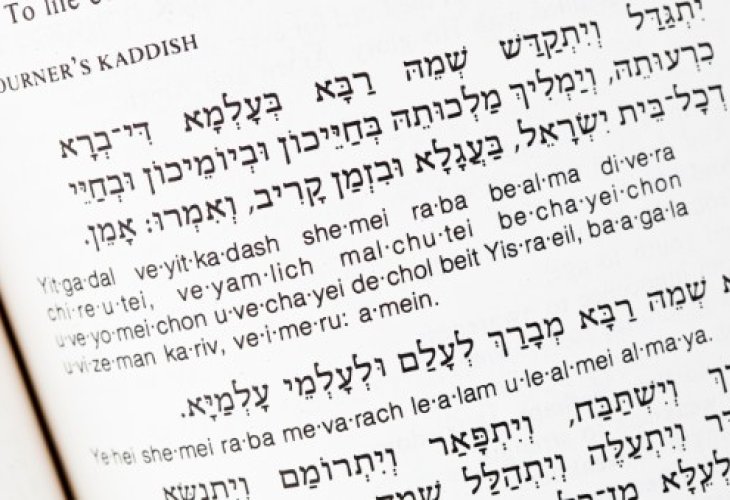Facts in Judaism
Kaddish: A Prayer that Echoes Beyond this World
At its core, Kaddish is a call for the sanctification of God’s name and the revelation of His kingship in the world that underscores our yearning for redemption.
- Zuriel Gavizon
- |Updated

What is Kaddish?
Kaddish is a powerful prayer written in Aramaic, the everyday language of the Jewish people in the time of the Talmud. It comes in several forms: Chatzi Kaddish (Half Kaddish), Kaddish Titkabal (Kaddish after the Amidah), Kaddish Yehei Shlama (Kaddish often said at funerals), Kaddish d’Rabbanan (Kaddish after learning Torah), and Kaddish HaGadol (the Great Kaddish, sometimes called Kaddish d’Agadeta).
Originally, Kaddish was recited after studying Aggadah (the Talmud's narratives and ethical teachings). Over time, it found its place in the synagogue service and became a central part of public prayer. Today, we say Kaddish at key transitions in the service - after Pesukei d’Zimrah (the introductory prayers of praise), after Aleinu (a prayer recited toward the end of the service), and after reciting a passage from the Oral Torah in the prayer service.
At its core, Kaddish is a plea for Hashem’s name to be sanctified and His presence revealed in the world. The phrase yitgadal v’yitkadash (“May His name be magnified and sanctified”) comes straight from a verse in Yechezkel: “I will be magnified and sanctified, and I will be known in the eyes of many nations.” In most traditions (aside from the Ashkenazic tradition), Kaddish also includes a hope for redemption and Mashiach: “V’yatzmach purkanei v’kareiv meshichei”—“May His salvation sprout forth and His Messiah come soon.”
Since Kaddish is all about glorifying Hashem’s name in this world, our sages held it in the highest regard. The Talmud states: “Anyone who answers ‘Amen, Yehei Shmei Rabbah’ with all their strength can have seventy years of harsh decrees torn up.” (Shabbat 119b). According to the mekubalim (Kabbalists), each Kaddish we say elevates the prayers that came before it and propels them through the layers of holiness.
Why is Kaddish in Aramaic?
Kaddish is recited in Babylonian Aramaic, the same language used in the Gemara. This wasn’t a coincidence. By design, it was formulated in the language the people understood. Like a heartfelt song that everyone understands, it was meant to be accessible.
But there's also a deeper layer of mystery. According to Kabbalah, angels assess the worthiness of a person’s prayers. If someone’s actions aren’t sincere, those angels might block their prayers from rising. But here’s the twist: angels don’t understand Aramaic. So when we pray in Aramaic, especially a prayer as powerful as Kaddish, those heavenly gatekeepers can’t stand in the way. That’s why some of our most spiritually intense prayers, like Brich Shemei (a prayer recited before taking out the Torah), are in Aramaic too.
A Personal Anecdote
Most people associate Kaddish with mourning, and for good reason. Saying Kaddish is one of the deepest honors we can give a loved one who has passed away. It’s not just about grief; it’s about elevating their soul, adding light to their journey, and bringing more holiness into the world in their name.
But did you know that the practice of reciting Kaddish Yatom (the Mourner’s Kaddish) doesn’t actually appear in the Babylonian or Jerusalem Talmud? Even the Rambam’s Mishneh Torah doesn’t mention it. So, where does it come from?
The Beit Yosef shares a moving story that formed the premise of this widespread custom. A certain rabbi once met the soul of a man who was carrying heavy loads of firewood on his back, suffering in Gehinnom. The rabbi asked, “Why are you doing this?” The soul replied, “This is my punishment every day. Unless my son says Kaddish for me or reads from the Nevi’im (Prophets) in my merit, I have no rest.”
So the rabbi found the man’s son and told him what to do. The son prayed, recited Kaddish, and honored his father’s memory. Not long after, the man’s soul appeared to the rabbi again, but this time, he was at peace. “You calmed my spirit,” he said. “Your kindness gave me rest.”
Kaddish isn’t just a prayer - it’s a bridge between worlds. It sanctifies Hashem’s name, elevates our own prayers, and honors the souls of those we love. Whether said in a minyan or whispered in quiet devotion, it’s a moment of connection that echoes far beyond this world.

